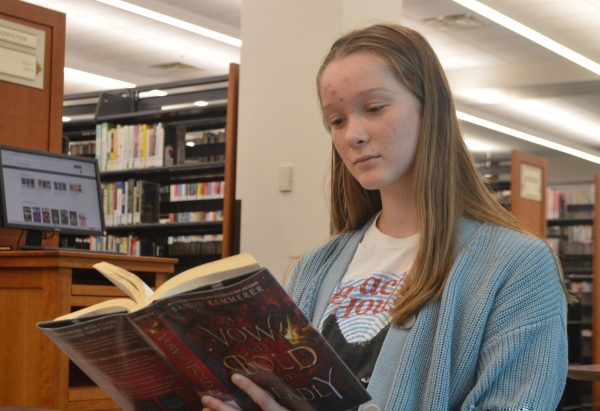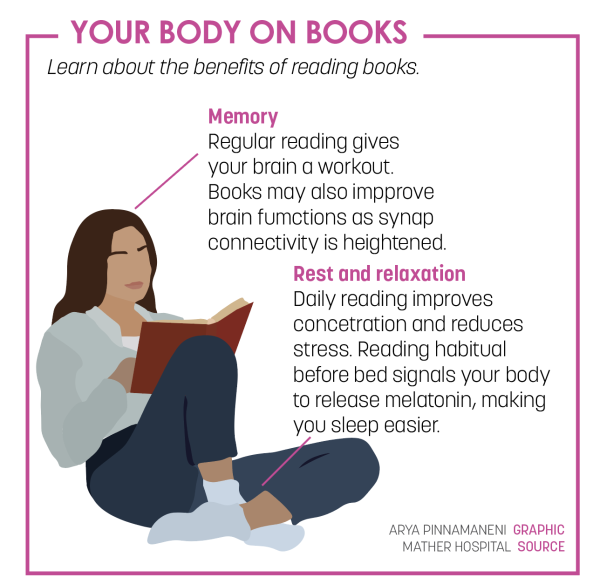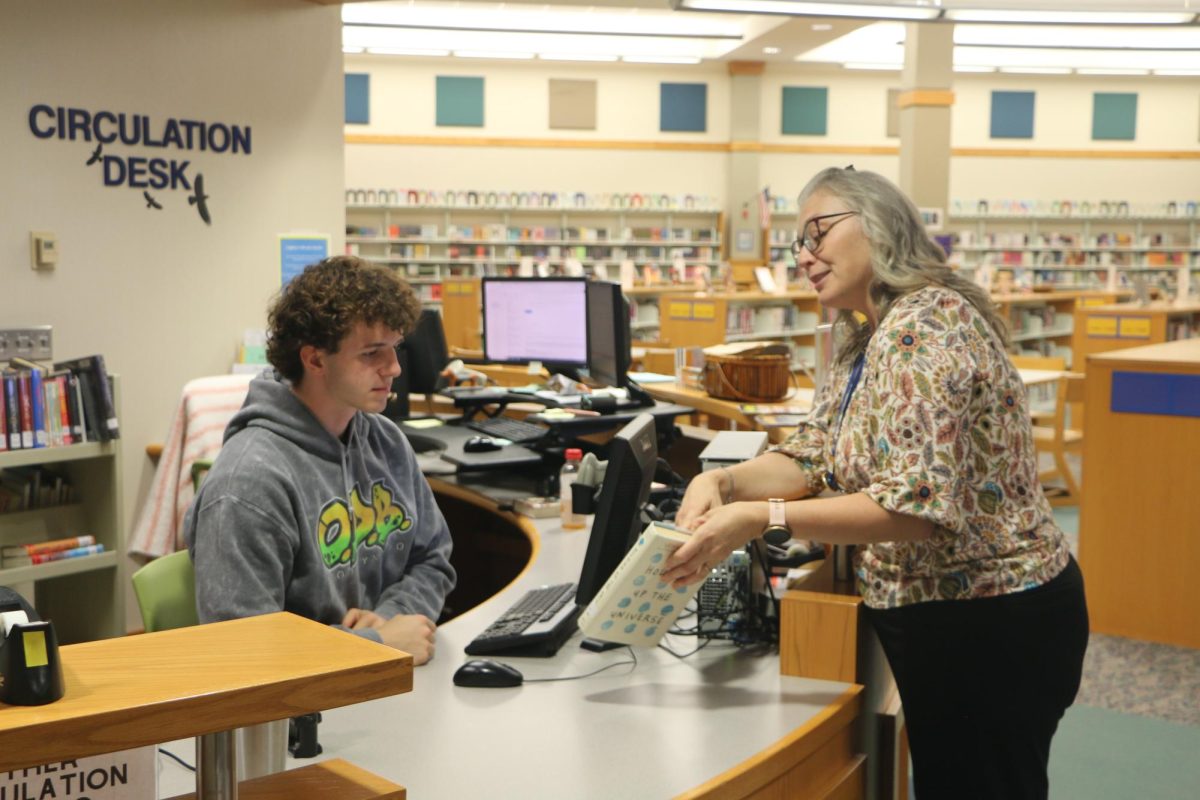For junior Jacqueline Ramsey, National Book Month is a reminder of the value of books and reading.
“National Book Month is important to bring awareness to the stories around the world,” Ramsey said via email. “Books can bring people together in a lot of different ways.”
But despite Ramsey’s sentiment, there has been a decline in the amount of students in the United States that read for fun. According to Pew Research Center, 29% of 13-year-olds in the United States said they rarely or never read for fun, which is up from the 8% in 1984.
Media department chairperson Terri Ramos said it’s essential to amend this decline in reading as books provide new ways of thinking.
“Books serve as windows and mirrors,” Ramos said. “When reading, I ask, ‘can I identify with the person in the book?’ I’ve found I can always identify with them one way or another.”

Like Ramos, junior Annalise Taller said she believes books have the unique ability to supply information while still holding their clear stance.
“Books have the power to expose truth, while also showing different viewpoints and perceptions on situations,” Taller said.
Ramos said reading is the method of attaining these truths and gaining new perspectives.
“We can only live our experiences,” Ramos said. “We only have our own truth, but books help us to learn other people’s truths.”
Ramsey said books not only broaden one’s perspective, but they can impact the way someone develops and grows.
“Books help individuals develop by helping them learn more about different topics and expanding their vocabulary,” Ramsey said. “They can learn about emotions, different ways people live, and grow their vocabulary through reading.”
Along with acquiring different skills, Ramos said reading also unlocks a certain creativity in the brain.
“Books are good at expanding wisdom, knowledge and understanding,” Ramos said. “If you read a lot and your brain is contemplating those different ideas, it can become more creative in the way it thinks.”
Although creativity may be gained from many things, Taller said with reading novels, especially fantasy, comes creativity and innovation.
“Fantasy novels are great at fostering creative experiences because they bring you into an entirely different world,” Taller said. “You can also get that from TV shows. But, the fact that you’re able to read something and be completely transported no matter where you are is incredible.”

Ramsey said books have the potential to spread creativity because of their framing and structure.
“Books have the power to make people think about topics, to see the idea laid out in a different way,” Ramsey said.
With the entirety of a book, Ramos said more knowledge is obtained, as opposed to reading a minimal social media post.
“In stories, with what we’re learning, you get more nuanced,” Ramos said. “It’s not 140 characters of a tiny post. It’s not a biased piece of information. Books are the whole story.”
Due to the importance of a complete story, Taller said it is essential to continue prioritizing reading in schools.
“Reading should be encouraged in school,” Taller said. “In elementary and middle school, for English class maybe you had to read 20 books per semester. It’s important to keep doing that in high school because it’s easy to get sidetracked with other stuff. We need to prioritize reading more.”
As students advocate for greater emphasis on reading, Ramos said she and others have been trying to advance it as well.
“I’ve been pushing a culture of reading in the school,” Ramos said. “I made a Good Reads window. I encourage teachers to take part in that because I want it to be a cultural thing that we’re reading and talking about reading.”
With the new culture of reading in schools, Taller said reading for fun should also be highlighted.
“It’s important to read, even just for fun,” Taller said. “I used to read a lot in middle school and now I read a lot again, but from freshman to sophomore year I stopped reading for enjoyment. I found it so much harder to read for classes.”
Like Taller, Ramos said she wants reading of any kind to be pushed for.
Ramos leaves students with one piece of advice: “You should read widely and you should read often. Consider all things and new things.”

































![AI in films like "The Brutalist" is convenient, but shouldn’t take priority [opinion]](https://hilite.org/wp-content/uploads/2025/02/catherine-cover-1200x471.jpg)









































![Review: “The Immortal Soul Salvage Yard:” A criminally underrated poetry collection [MUSE]](https://hilite.org/wp-content/uploads/2025/03/71cju6TvqmL._AC_UF10001000_QL80_.jpg)
![Review: "Dog Man" is Unapologetically Chaotic [MUSE]](https://hilite.org/wp-content/uploads/2025/03/dogman-1200x700.jpg)
![Review: "Ne Zha 2": The WeChat family reunion I didn’t know I needed [MUSE]](https://hilite.org/wp-content/uploads/2025/03/unnamed-4.png)
![Review in Print: Maripaz Villar brings a delightfully unique style to the world of WEBTOON [MUSE]](https://hilite.org/wp-content/uploads/2023/12/maripazcover-1200x960.jpg)
![Review: “The Sword of Kaigen” is a masterpiece [MUSE]](https://hilite.org/wp-content/uploads/2023/11/Screenshot-2023-11-26-201051.png)
![Review: Gateron Oil Kings, great linear switches, okay price [MUSE]](https://hilite.org/wp-content/uploads/2023/11/Screenshot-2023-11-26-200553.png)
![Review: “A Haunting in Venice” is a significant improvement from other Agatha Christie adaptations [MUSE]](https://hilite.org/wp-content/uploads/2023/11/e7ee2938a6d422669771bce6d8088521.jpg)
![Review: A Thanksgiving story from elementary school, still just as interesting [MUSE]](https://hilite.org/wp-content/uploads/2023/11/Screenshot-2023-11-26-195514-987x1200.png)
![Review: "When I Fly Towards You", cute, uplifting youth drama [MUSE]](https://hilite.org/wp-content/uploads/2023/09/When-I-Fly-Towards-You-Chinese-drama.png)
![Postcards from Muse: Hawaii Travel Diary [MUSE]](https://hilite.org/wp-content/uploads/2023/09/My-project-1-1200x1200.jpg)
![Review: "Ladybug & Cat Noir: The Movie," departure from original show [MUSE]](https://hilite.org/wp-content/uploads/2023/09/Ladybug__Cat_Noir_-_The_Movie_poster.jpg)
![Review in Print: "Hidden Love" is the cute, uplifting drama everyone needs [MUSE]](https://hilite.org/wp-content/uploads/2023/09/hiddenlovecover-e1693597208225-1030x1200.png)
![Review in Print: "Heartstopper" is the heartwarming queer romance we all need [MUSE]](https://hilite.org/wp-content/uploads/2023/08/museheartstoppercover-1200x654.png)




